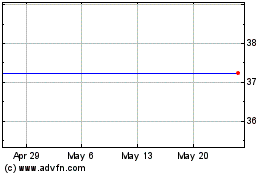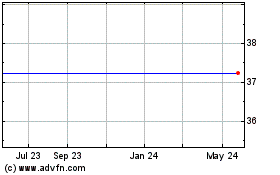UPDATE:Exelon Expands Nuclear Operations With Constellation Deal
April 28 2011 - 3:25PM
Dow Jones News
Exelon Corp.'s (EXC) bid to purchase Constellation Energy Group
Inc. (CEG) will allow the company to expand its nuclear power
footprint, something it has worked to do for years, while also
boosting its retail footprint.
The $7.9 billion all-stock deal announced Thursday to acquire
Constellation would create the second largest electric and natural
gas distributor with 6.6 million customers, after Duke Energy Corp.
(DUK) once Duke completes its acquisition of Progress Energy Corp.
(PGN).
Exelon, the largest nuclear power plant owner in the U.S., has
been interested in buying more plants for years, but attempts to
buy Public Service Enterprise Group Inc. (PEG) and NRG Energy Inc.
(NRG) were thwarted by regulatory hurdles.
The Chicago company chose Constellation after carefully
reviewing regulatory issues in several states. The regulatory
environment has improved in Maryland after FirstEnergy Corp. (FE)
was able to receive approval to acquire Allegheny Energy recently,
said Christopher Crane, chief operating officer of Exelon, who will
become chief executive after the deal closes. "We have looked
closely at the most recently approved transaction...and we have
scaled our offer off of that," he said.
Exelon and Constellation have promised not to cut utility jobs
for two years and to invest in renewable projects in Maryland.
Executives are confident their deal will close in early 2012.
By acquiring Constellation, Exelon will increase its nuclear
power generating capacity relatively cheaply, by 11% to 18,968
megawatts, and get a bigger foothold in the mid-Atlantic
electricity market. This electricity market is the single largest
one in the U.S. and also has some of the highest electricity
prices. The combined company's profits will be split between
utility operations and selling power in competitively.
But the "marriage is perfect" between Exelon's substantial
generation portfolio and the ability to sell power to consumers
directly through Constellation's branded retail business, said Mayo
Shattuck, chief executive of Constellation, who will become
executive chairman of the combined company.
More customers are shopping around for low-cost power in markets
like Maryland, New Jersey and Illinois. "It's going to be more and
more important for generators to have this front," to go after
those consumers, Shattuck said.
Having a bigger retail outlet for power plants that sell power
in competitive markets, which represents half of Exelon's profits,
will help cut costs and improve margins in this merchant power
business, executives said.
Exelon started pursuing Constellation specifically about six
months ago because their business models are similar, Crane said.
Both companies have merchant businesses, nuclear plants and utility
operations.
Constellation represents a relatively cheap option for getting
new nuclear power because weak power prices have made it
uneconomical to build new reactors in competitive markets where
costs are not covered by utility customers.
Exelon executives said they aren't interested in building a new
nuclear plant.
"In the long run, of course, we are interested, but in the
near-term, new nuclear plants are simply not economic" with natural
gas prices between $4 and $5 per million British thermal units,
said Exelon Chief Executive John Rowe, who will retire after the
deal closes. Gas plants are cheaper to build and operate.
Electricite de France SA (EDF.FR) currently has a stake in
Constellation's existing nuclear fleet, and that partnership will
not be affected by the deal. Late last year, Constellation pulled
out of a separate partnership with the French utility to build new
generation in the U.S. because of poor economic conditions.
Constellation also ended its bid to build a third reactor at an
existing nuclear facility in Calvert Cliffs, Md., after seeing
unfavorable terms from a Department of Energy loan guarantee. EDF
continues to pursue the project. "We won't be involved in it; that
is an EDF venture," Crane said.
Nuclear power will represent about 55% of Exelon's total
generating capacity of 34,401 megawatts after the deal closes. This
represents a smaller portion of the company's power capacity
because Constellation will also owns gas and coal plants.
Meanwhile, the merger is expected to generate at least $250
million in cost savings annually, but Crane said "we are not ready
to predict actual headcount reductions, computer savings,
technology advances or liquidity costs savings."
The combined companies will be able to reduce the amount of
collateral needed for selling power in competitive markets, Crane
said. Post merger, Exelon would be deemed less risky because the
amount of power sold through retail operations would more closely
match power-generating capacity. Credit lines totaling about $10.3
billion at both companies could be reduced by 30% to 40%.
Constellation shares were recently up 5.5% to $36.19 and Exelon
rose 1.5% at $42.10.
-By Naureen S. Malik, Dow Jones Newswires; 212-416-4210;
naureen.malik@dowjones.com
Constellation Energy (NYSE:CEG)
Historical Stock Chart
From Jun 2024 to Jul 2024

Constellation Energy (NYSE:CEG)
Historical Stock Chart
From Jul 2023 to Jul 2024
